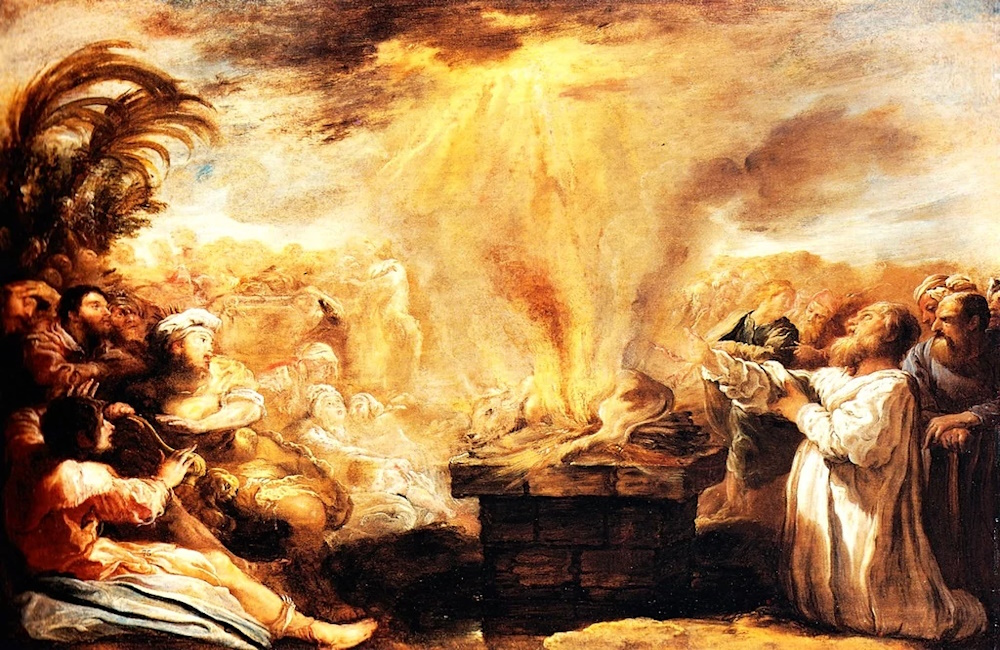Direct Communication with God: Experiences of Jewish Prophets
In Judaism, prophets are distinguished by their direct and personal interactions with God. This direct communication is a hallmark of their prophetic role and validates their authority and messages. Here’s how different Jewish prophets experienced their encounters with God:
Moses (Moshe): The Face-to-Face Encounter
Moses is considered the greatest of all Jewish prophets, largely due to his unique and direct communication with God. The Torah describes Moses’ interactions with God as being “face to face” (Deuteronomy 34:10), a term used to convey a close and personal relationship. This direct communication was not limited to verbal messages but included profound, direct experiences of God’s presence.
One notable instance of Moses’ direct encounter with God occurred at the burning bush. In this profound moment, God spoke to Moses from within a bush that was burning but not consumed by the flames (Exodus 3:2-4). This theophany, or visible manifestation of God, was a pivotal moment in which Moses was commissioned to lead the Israelites out of Egypt. The direct, dramatic nature of this encounter underscored Moses’ unique role as God’s chosen leader and prophet.
Samuel (Shmuel): The Voice Calling
Samuel’s prophetic calling came as a child, marked by a direct, audible voice from God. Samuel was serving in the temple under the high priest Eli when he heard his name being called during the night. Initially, Samuel thought it was Eli calling him, but Eli realized it was God’s voice and instructed Samuel to respond (1 Samuel 3:4-10). This direct auditory experience was the beginning of Samuel’s prophetic ministry and illustrated the personal and immediate nature of his communication with God.
Elijah (Eliyahu): The Divine Encounter on Mount Carmel
Elijah’s prophetic role was characterized by dramatic and direct interactions with God. One of the most notable encounters was on Mount Carmel, where Elijah challenged the prophets of Baal to a test of divine power. Elijah prayed to God, and fire descended from heaven to consume his sacrifice, proving God’s supremacy (1 Kings 18:38). This miraculous event was a direct manifestation of God’s power and presence, affirming Elijah’s role as a prophet and validating his message against idolatry.
Isaiah (Yeshayahu): The Visionary Revelation
Isaiah’s prophetic experiences were marked by vivid and direct visions of God. One of the most famous accounts is Isaiah’s vision of God in the temple, described in Isaiah 6. In this vision, Isaiah saw the Lord seated on a high and lofty throne, with seraphim attending Him and the temple filling with smoke. This direct and awe-inspiring vision led to Isaiah’s commissioning as a prophet, showcasing the profound and personal nature of his communication with God.
Jeremiah (Yirmiyahu): Direct Instructions and Visions
Jeremiah’s prophetic role involved direct divine communication, often through visions and personal revelations. For instance, Jeremiah’s call to prophethood came through a direct vision in which God touched his mouth and placed His words within him (Jeremiah 1:9). Throughout his ministry, Jeremiah received specific instructions and visions from God, reinforcing his role as a direct conduit for divine messages.
Jonah (Yonah): Direct Command and Reluctance
Jonah’s experience with God involved a direct command to deliver a message to the city of Nineveh. Although Jonah initially fled from this mission, he ultimately received and fulfilled God’s directive. Jonah’s encounter with God included direct instructions and a subsequent miraculous event, such as being swallowed by a great fish, which served as a form of divine intervention and confirmation of his prophetic role (Jonah 1:17; 3:1-2).
Conclusion
The direct experiences of Jewish prophets—through audible voices, dramatic visions, and miraculous signs—highlight their profound and personal communication with God, affirming their roles as authentic messengers of divine will. Figures such as Moses, Samuel, Elijah, Isaiah, Jeremiah, and Jonah each had direct encounters with God, which established their credibility and authority as prophets.
In contrast, Muhammad received his revelations through an intermediary, the angel Gabriel, rather than direct communication with God. While Muslims regard the Quran as the literal word of God conveyed by Gabriel, the absence of direct interaction between Muhammad and God raises significant questions about the nature of his prophetic experience. In both Jewish and Christian traditions, it is acknowledged that the devil can masquerade as an angel of light (2 Corinthians 11:14), but it is explicitly forbidden for the devil to impersonate God Himself. Given this understanding, Muhammad’s revelations—delivered by an angel who, from a critical perspective, could be a deceptive force—are viewed by some as being influenced by a false source. This perspective suggests that Muhammad’s teachings, rather than being divinely inspired, may have originated from a deceptive entity pretending to be Gabriel.
The Biblical perspective maintains that true prophecy is marked by direct divine communication and alignment with established divine principles. Given that Muhammad’s teachings diverge from these biblical teachings and are transmitted through an intermediary rather than direct contact with God, this raises questions about their authenticity and alignment with traditional divine revelation. This difference indicates that Muhammad’s teachings are not aligned with the direct, authoritative messages conveyed by the prophets of Judaism and Christianity.
